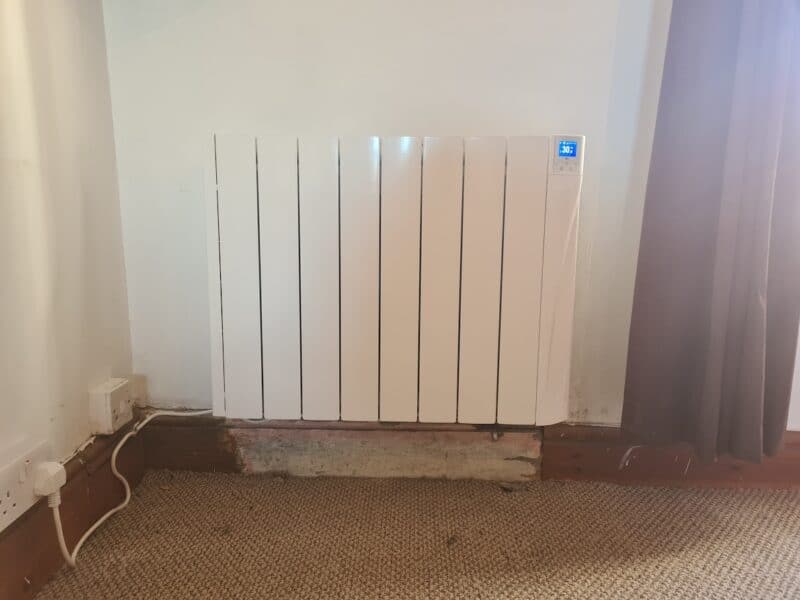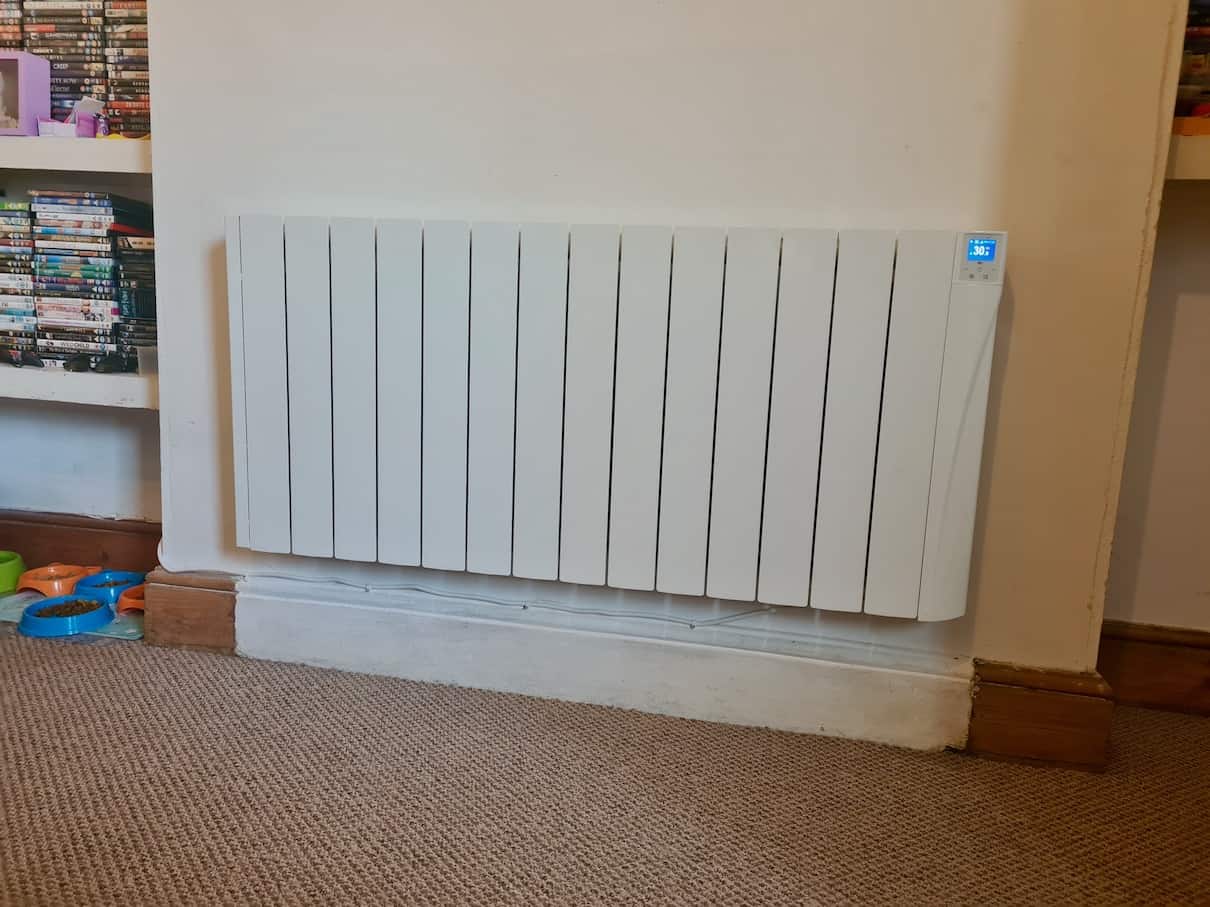One of the things that I have always hated about our house is the heating system. We have an old boiler (a huge tank) and there was night storage heaters in most rooms. As much as we would love to, we’ve just not had the money to move over to a combi boiler and central heating.
Why electric radiators?
In 2020 we switched our energy supplier from Scottish Power to Bulb and somehow, all of our storage heaters ended up stopping working. We think it’s something to do with Economy 7 but we still haven’t gotten to the bottom of it. Anyway, as this happened quite close to winter we knew that we had to do something as the house gets really cold.
Of course, money was an issue so we decided to replace the two storage heaters in the living room only as it is the most used room of the house. We decided to have electric radiators installed in the living room on 4th November 2020.
After some research, we chose two Harmoni Lugo+ electric radiators; one large and one small. These cost us £740 for both plus paying an electrician to fit them for us. At this time, we knew that electric radiators were going to an an expensive option to run, compared with gas central heating but we didn’t have much choice.
I wrote a post about making the switch in December 2020 and have since had a few questions about how much the radiators actually cost to run. I thought it would be easiest to show the difference between our electric bills. Below you will see our bills from when we first switched to Bulb in the summer to our bill for January to February 2021.

Bill amounts
- 22 Jul – 21 Aug £69.44
- 22 Aug – 21 Sep £65.10
- 22 Sep – 21 Oct £89.92
- 22 Oct – 21 Nov £127.61
- 22 Nov – 21 Dec £241.21
- 22 Dec – 20 Jan £197.36
- 21 Jan – 20 Feb £208.25
As you can see, the difference in the amount are quite different and the electric radiators really bump up the bills. I must mention here that these are our only source of heating apart from one portable heater that we use upstairs now and again.
Although these prices are quite a lot more than our summer bills we have been quite careful when using the radiators. We barely ever use the small radiator and mostly only have the large one on. When Erin is at school we try to make sure it’s not on during the day although some days we have had it on from around 11am until 11pm. We also had the big radiator on a lot more than normal during Storm Darcy in February as it was so cold.
When we moved to Bulb they gave us a suggested direct debit amount based on the figures we gave them from Scottish Power. To start with we were paying roughly £105 a month even though we weren’t using that much energy. Our storage heaters always increased our bill in winter so I’d let the account build up a bit so we had extra ready. We also had a referral payment added to our account as someone we knew also joined Bulb through us. As of December 2020 we increased our monthly payment to £120. At this amount, we will be able to build up some credit throughout the year to cover the increase next winter.

Would I recommend electric radiators?
This is honestly a bit of a hard question to answer. I actually really like our electric storage heaters and they look nice in our living room. They were an easy option for a replacement without having to make a massive switch to gas.
I like that we can control the temperature easily and that they can be turned on and off when we want, even programmable if you want to and can be used with an app. This saves us having night storage heaters on all the time like we did before.
Running the radiators are quite expensive and we are careful with how we use them. However, we do need to replace storage heaters in the bedrooms and these would cost roughly £400 each (including electrician’s fees) and they would be easily installed. They also wouldn’t be used very much so therefore wouldn’t add a massive amount to our winter bills.
PIN IT FOR LATER



Thanks for your honest review. I think it can have a huge impact on your well being if a house isn’t heated properly. These radiators sound like a good solution
We actually stopped using our portable electrical radiators as we noticed they were really starting to bump up our electricity bill. I think the key is as you say to use them carefully.
These types of radiators as you mentioned do increase the bills. Sounds like they are not an option though as your only source of heating.
Things like this are expensive to use. We had a new boiler put in about 6 years ago as ours topped working, we had to borrow £1000 from Lee’s grandmother and pay her back monthly as we just couldn’t afford it.
That is a big increase but I know electric heaters are expensive to use. A boiler and new system would cost a fortune so I guess this is your best option at the moment to keep the electric radiators.
Looking at what you pay for them, I think it isn’t much more than we pay for our gas radiators. I do like the look of them too. We are looking at a new boiler – did you know you can get grants for them if your income is low?
I have always thought electric radiators were too expensive for me personally so thanks for this honest review.
It’s good to see some real results and how much they cost, it’s a good option for people who can’t have gas rads
Would be good to know what the bills were with the night store heaters to get a comparison.
Sadly, as we moved energy suppliers we no longer have access to last winter’s bills where we used the storage heaters. However, the bills were not as much as they are with the electric radiators.
You should still be able to get them to send previous usage figures. Well worth publishing as a reàl comparison – rather than just recollections as one often sees on forums.:)
Even with the previous figures they wouldn’t be an equal comparison. There are storage heaters in the house that now don’t work and have not been replaced so the usage isn’t the same as last year.
Looking at the bills it looks like night storage heaters are much cheaper to run specially when you already have them.
I’m in a similar position but intend to upgrade my living room night storage heater to a modern high heat retention programmable night storage heater at a cost of about £600. It works out how much heat your likely to use the following day using a learning algorithm and only charges the heater with the appropriate amount of energy.
Without questioning your integrity, is it honest to not heat rooms at all in order to control costs.
It is slightly unclear: are the heaters you put in electric radiators that use electricity when they are on, or electric storage heaters which heat up at night? Your other post (that links here) suggests electric radiators, but when you talk of liking them, they are designated “storage heaters” rather than radiators!
If they are radiators was your meter correctly updated to a single tariff when you put them in? That would make a lot of difference to the bills.
I ask because I am trying to make decisions about electric radiators myself. I can’t have modern storage heaters because I have noise sensitivity problems, and modern ones work by using fans, but I am not sure whether to keep the totally ancient monsters of storage heaters I have going for as long as possible, or upgrade to electric panel radiators as soon as I can. They are obviously far less wasteful because my storage heaters are almost totally uncontrollable, but other than that, no-one seems to agree on which is cheaper to run, even when they don’t seem to have any obvious interest in promoting one over the other. Possibly it depends on environmental factors and what is actually needed from them.
@Pete Deasey: surely heating rooms or not for any reason is a personal decision for a family in their own house?!